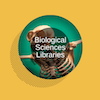Need a book from the library?
We are open to all current staff and students of the University.
Searching - Library Catalogue
iDiscover can be used to search for printed books and journals in most of the University's libraries, as well as ebooks, electronic journals and articles. It can be accessed via any computer or mobile device connected to the internet.
Select "Zoology: Balfour & Newton Library" on iDiscover to retrieve physical resources available in our library.
Visit the iDiscover quick guide for the full functions of the platform.
Finding electronic journal content
See the Journals page for more information and download the Lean Library browser extension to access full text articles anywhere.
Finding print items in the library
When you are looking for print items in the library.
- Take a note of the location and classmark listed on iDiscover
- If the book is listed as available on iDiscover, it should be available on the library shelves.
- For journals, there is a printed alphabetical list of all our holdings as the classmarks are not listed on iDiscover.
- If the book is out on loan, you can place a request via iDiscover. You must be logged into iDiscover for the request option to appear.
- If the book should be on the shelves but you are unable to find it, please ask the library staff for assistance.
Use the Map of the Library to find your items. The library uses an adaptation of the Bliss Classification Scheme.
Borrowing books
Use the self-issue machine in front of the Library Office to borrow books with your University Card.
- Loans are auto-renewed.
- Books can be recalled during your borrowing allowance. If so, return the book within 3 days or contact us if you are having difficulty doing so.
- If you need a book that is listed 'on loan', you can request it on the iDiscover platform once you log in. The Senior Library Assistant will let you know when it is available.
- You will receive a statement on the second day of every month which shows a snapshot of what items you have on your account.
- Journals, Special Collection and Reference items cannot be borrowed.
Loan periods and book allowances:
| University Staff, Postgraduates & Visiting Scholars |
12 Books |
for 28 days |
Auto-renew If a 'recall email' is sent, return within 3 days |
| Undergraduates | 6 books | for 28 days |
Auto-renew If a 'recall email' is sent, return within 3 days |
Returning books
Use the self-issue machine in front of the Library Office to return books. There is also a Book Returns box at the Zoology Reception desk where you can return books during opening hours (8:30am to 4:30pm Monday to Friday). Library staff will collect returned books from Reception when they are on site and remove them from the borrower’s record. Books should be automatically renewed but there are no fines if items are overdue. Books from other libraries cannot be returned to the Zoology Department.
Can’t find the item you need?
Speak to library staff if you need help finding items or to discuss other options. If we do not have the book you need for your course or research, place a book request and we'll try to get it for you. If you need anything else, get in touch and we'll explore your options with you.
Classification scheme
The Library uses the Bliss Classification Scheme, in which letters are used to indicate the main categories of subject matter.
Letters E to H are used for general areas of biology and zoology (EN genetics, GD physiology).
Letters K to Y are used for the major taxonomic groups of animals.
The guiding principle is that you go from the general to the particular. For example, 'Q' denotes the section dealing with general works on insects. Chapman's 'Insects' has the classmark Q (45), which means that it is the 45th general work on insects on the shelves.
The section 'Q' is broken down as follows:
Books on the order Orthoptera are classified QF. Ragge's 'Grasshoppers, crickets and locusts' has the classmark QF (10), which means that it is the 10th book on Orthoptera on the shelves.
The classification scheme also has twelve numbered schedules. These mainly apply to the major taxonomic groups (birds, crustacea, insects, molluscs, fishes, mammals):
1. Catalogues and shelf lists
2. Bibliography
3. Taxonomy
4. Morphology
5. Physiology
6. Embryology
7. Behaviour
8. Ecology
9. Oology (in the case of birds)
10. Methods
11. Pathology
12. Palaeontology
These follow the general works, coming before the orders and families. Of all the schedules, 5 is the most frequently used: Wigglesworth's 'Principles of insect physiology' which has the classmark Q.5 (5).
We also use subscript letters and numbers to denote different editions, copies or volumes. If a book is a second edition it will have a 'b' after the number in brackets. If a book is a third edition it will have a 'c' after the number in brackets, and so on. If there is more than one copy of the same book, it will have a subscript copy number after the number in brackets. For example, a copy of the fourth edition of Krebs' 'Behavioural ecology' has the class mark GFU (117d3). This means that it is the 3rd copy of the fourth edition. On the iDiscover catalogue, copy numbers are denoted by Roman numerals.




